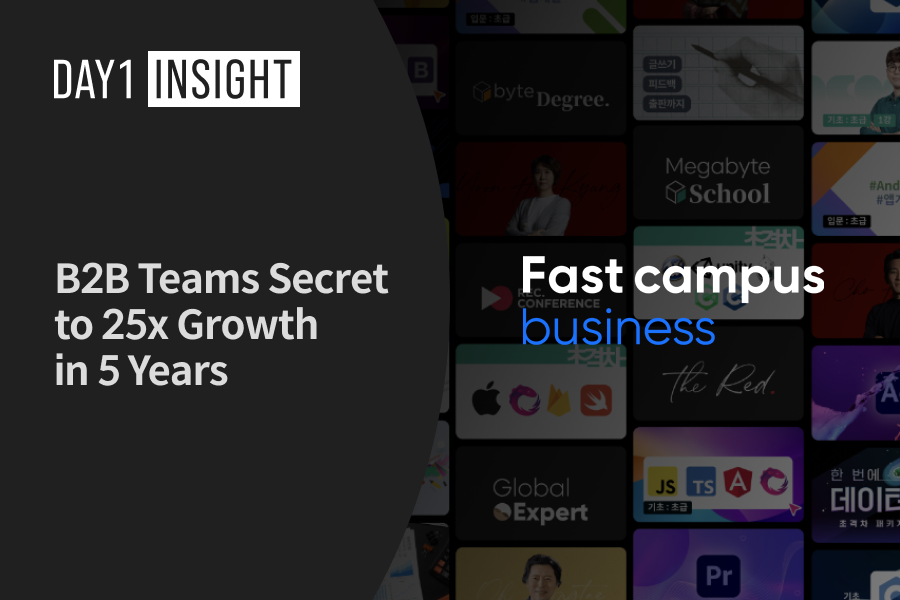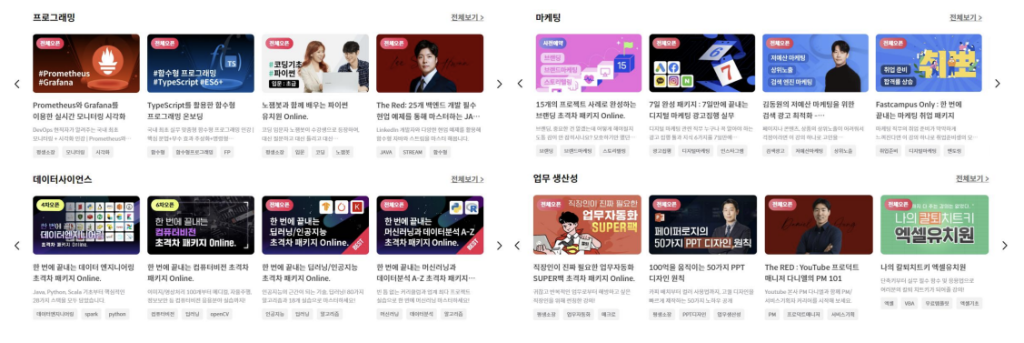Q: Can a “Lightweight Drinker” Thrive in B2B Sales?

When you hear the term “B2B sales,” a certain image likely comes to mind: a sharp-dressed, smooth-talking salesperson, expertly navigating endless connections, and—more often than not—sealing deals over drinks. Alcohol, it seems, is as much a part of the B2B sales toolkit as a briefcase.
But Fastcampus has never quite fit that mold.
In 2017, when Fastcampus first ventured into B2B, it didn’t have the seasoned sales pros, the high-powered networking events, or the connections that many competitors seemed to rely on. It was an experiment, run by a few junior employees and one intern.
“We still don’t have dedicated salespeople or big client dinners to close deals.”
L (Head of B2B Division, Fastcampus)
That’s precisely why Fastcampus’ B2B journey is worth paying attention to. What began with a handful of curious employees and little certainty has now evolved into one of the company’s core businesses. That small team, who once worked in the dark with little more than their gut instincts, has grown the division into a business worth billions. From 700 million won in revenue in its first year to a remarkable 18 billion won by 2022, the story of Fastcampus’ B2B division is one of determination and trust.
We sat down with L, who started as an intern and grew with the team, to hear the full story.

Great B2C Content Begets Inbound Leads
In the early days, survival was the goal. Fastcampus’ focus was razor-sharp: create the best content, attract more customers. The idea of expanding into the B2B space seemed like a distant dream. There wasn’t the manpower for it, nor was there the desire to step into a market already dominated by entrenched players—companies that had been around for years, many of them subsidiaries of major corporations.
But sometimes, opportunities grow where you least expect them.
“Hello? Is this Fastcampus? Do you offer corporate training?”
It was a question Fastcampus hadn’t anticipated. As the company’s B2C customer base swelled, HR teams began noticing “Fastcampus” on expense receipts for employee education. The reviews came back glowing. Employees who had taken courses raved about them, and HR departments started to take notice. What started as a trickle of curiosity—”Do you offer corporate training?”—soon became a flood of requests.
Internally, it was clear: “We need to start B2B.”
The Two-Year Question: From Doubt to Certainty
Yet, even with demand knocking on the door, Fastcampus’ B2B venture wasn’t an instant success. For the first two years, from 2017 to 2019, the team faced constant uncertainty. Management had their doubts. Even the team itself, working tirelessly, wondered if it would all be worth it.
Then, in 2019, the business turned a corner. What had been a slow, frustrating trickle of growth began to pick up steam, doubling and even tripling revenue year on year.
“B2B isn’t the kind of business where everything blows up overnight. Back in 2017 and 2018, we were booking half-day, or at most three-day training sessions. Sure, companies were curious, but we weren’t closing any big deals. But those small contracts built trust, and now those same companies are coming back to us with major projects. The work we put in over those two years is paying off.”
A short-term training contract doesn’t turn into an annual partnership unless there’s something special behind the scenes. Fastcampus’ corporate training programs had just the right spark to turn passing interest into lasting relationships.
What Makes Fastcampus Corporate Training Special?
1) Fastcampus Originals:

In the streaming wars, original content is king. But it turns out, this principle applies just as well to corporate training. As Fastcampus’ roster of B2B partners grew, the size of the contracts grew with it, and one of the key differentiators was the company’s ability to create custom content in-house.
“Our competitors typically buy content from third-party providers. Their clients pick from a set menu of pre-made courses, and there’s little room for customization. But at Fastcampus, we’re constantly creating new content for our B2C business, which means we have a rich library to draw from. And since we produce the content ourselves, we can customize it to fit each corporate client’s needs.”
2) Customization: The Secret Ingredient

For example, if a company requests big data training for its employees, Fastcampus doesn’t just pull something off the shelf. They sit down with both the HR team and the employees who will be taking the course. Together, they design a curriculum that fits like a glove.
“Take our deep learning course, for example. When we met with the employees who would be taking it, we realized they didn’t need all the algorithms we usually cover. Their work only required two. So, we stripped away the unnecessary parts and tailored the course specifically to what they needed.”
And if a manufacturing company requests a retail-focused course, Fastcampus goes the extra mile, sourcing data relevant to the client’s industry. When proprietary data can’t be shared for security reasons, they use publicly available data to create a near-perfect match for the client’s needs.
3) Speed with Depth
You might think such a high level of customization would slow things down. But one of the reasons clients keep coming back to Fastcampus is the speed with which they deliver. There’s no “Let me check with operations and get back to you” here. Instead, one manager handles everything—from consulting to planning to execution—ensuring that the entire process moves quickly without sacrificing quality.
“We’re mostly education majors or specialists ourselves, and we’re always learning about the domains we teach. So, when we sit down with a client, we’re not just there to take notes. We’re fully engaged in the planning, discussing everything from the curriculum to the budget. Clients love it.”
The Goal of Corporate Training: Creating Value for Clients
At the end of the day, all business is about creating value. If corporate training doesn’t lead to tangible results, it’s one of the first things to get cut from the budget. Fastcampus knows this, which is why they focus on delivering training programs that drive real business growth for their clients.
“If training doesn’t translate into business growth, HR budgets are usually the first to be slashed. We aim to offer programs that provide measurable impact.”
To make sure clients walk away with more than just notes, every Fastcampus corporate training program includes a hands-on project. And in some cases, these projects have done more than just boost knowledge—they’ve actually driven real business growth.

“It’s not just about delivering a great lecture. What really matters to us is figuring out how our training enhances the skills of the employees and, in turn, what kind of impact those skills are having on the client’s business. We’ve even developed detailed evaluation criteria for these projects to track those outcomes.”
This belief—that our clients’ growth is the key to our own—has fueled a 25-fold increase in Fastcampus’ B2B revenue in just five years. And the cherry on top? We’ve been hearing a lot of unexpected good news: many of the HR managers we’ve worked with have since been promoted, thanks to the success of their training programs.
✍️Key Takeaways
- B2B success doesn’t happen overnight. It requires patience and consistent effort.
- Standardized services might save the supplier time, but customized services save the client time—and drive long-term revenue.
- When corporate training leads to visible business growth, companies will continue to invest in it. Focus on delivering education that fuels your clients’ growth, and your business will thrive.